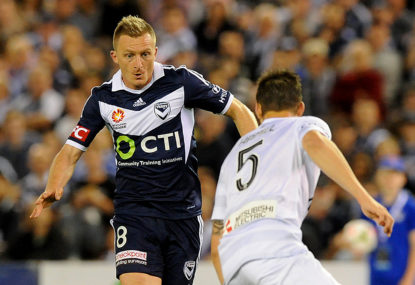This week might have been all about players misbehaving, on and off the pitch, but given that the A-League is generally struggling to hit the heights of a couple of seasons ago, is any publicity good publicity?
It’s a concept that fans of the AFL and NRL, or even the English Premier League, would be familiar with, but the A-League has largely managed to steer clear of too much player controversy in the past couple of years.
Of course there have been many player incidents over the 10 years of the league, especially in the early days. I think in particular of incidents such as the Joel Griffiths sack-whack, Danny Vukovic handling a referee in a grand final, and Kevin Muscat’s tackle on Adrian Zahra.
But in recent years the controversy has generally centered around club administrators and their financially problems, poor refereeing, administrators squeezing active fans, and controversial comments from coaches such as the Josep Gombau’s to a journalist about his son’s goalkeeping ability.
Generally, A-League players have done a good job of staying out of the headlines, especially for poor behaviour off the field.
Whether there were incidents that didn’t come to public light, and there’s likely to have been at least a couple, or whether they didn’t come to public light because the A-League wasn’t considered big and popular enough, Australian footballers have generally had a clean reputation.
I’ve often felt that footballers in general, small fish in a very big sea irrespective of who they are, stack up well against the local codes where players are often over-glorified and turned into big fish in a very small pond.
This week, though, has been a little different, with two Perth Glory players Andy Keogh and Josh Risdon getting themselves in a spot of of bother after taking on Adelaide United in Adelaide on Sunday.
As football in Australia continues to grow and with it the profile of Australian-based footballers, more and more eyes will be on how they conduct themselves off the field, and the expectation will be that standards remain high.
Even on the field, in the past few seasons, there appears to have been less weekly incidents to dissect as the standard of football appeared to be on the rise, at least up until the high point that was season eight.
There was once a time when three or four players would be cited by the match review panel (MRP) every week.
‘Overly fussy’ was often the cry from fans and clubs.
In the past couple of seasons some sense appears to have come over the MRP with less incidents being highlighted. The integrity of the panel came under serious attack last season by the Newcastle Jets after an incident involving Joel Griffiths against the Western Sydney Wanderers.
It prompted the FFA to issue a stern defence of the MRP, with Damien de Bohun moved to say: “The MRP system is designed to strike a fair, sensible and proportionate balance between the demands of running a professional competition and providing clubs and players with an opportunity to be heard”.
The FFA went on to cite the improvement and constant changes in the process since a major review in 2011, regular feedback from clubs, and reviews at the end of each season.
There’s little doubt that things have improved in terms of the citing process, and these days it’s the bigger incidents such as the famous Ali Abbas and Brendan Santalab racism incident out of a Sydney Derby last season that appear to be reserved for the Independent Disciplinary Committee.
So it was perhaps a little out of left field that the Sebastian Ryall incident with Gui Finkler in the Big Blue on Saturday night was referred from the MRP to the disciplinary committee for an “act of simulation”.
While there was no doubt it wasn’t a penalty and that Strebre Delovski had incorrectly seen Finkler’s arm contact Ryall, the suggestion that Ryall dived to win the penalty looked a little far-fetched, even live, and so it proved in the disciplinary hearing on Wednesday evening.
What Ryall should have been sanctioned for was the meal he made post the awarding of the penalty, tapping Finkler on the head as he got up smiling about the penalty win.
While there was little doubt that Ryall hadn’t dived, and it wasn’t a penalty, it was the unsporting conduct from Ryall that left a bitter taste for many. The recriminations might continue for while.
If anything, this must have been close to breaching the National Code of Conduct that Melbourne Victory striker Besart Berisha was cited under on the same day.
While there was no footage of that incident, a friend who is a Sydney FC member and was in the bay Berisha’s gesture was made to, with her 10 and eight-year-old kids, was irate, claiming she’d be contacting the FFA to complain.
When she did she was told there had been numerous complaints.
It wasn’t a good match for two players who’s disciplinary reputation over the years hasn’t been great. But for the A-League it’s created headlines and talking points at a time it probably needed a few.
It’s also managed to take the focus away from the dramas that continue to beset clubs like the Jets and Mariners.
With the standard of football across at least three of last week’s round at a poor level, the player talking points are certainly a diversion, and at least get people talking about the A-League.
But is it a case of any news being good news, or just a diversion from some of the problems festering in a league that arguably rested on its laurels after the success of season eight?





























































































